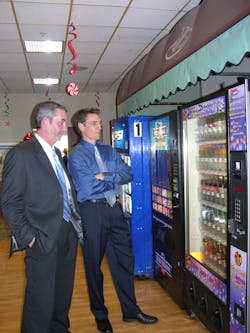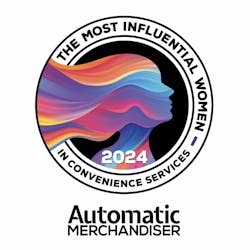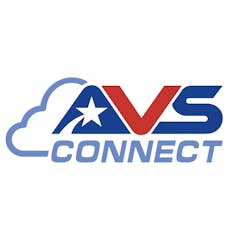Marketing and running a business is challenging. Colin Walsh learned this first hand while working at his father's vending company, Coin Café. Majoring in graphic design, Walsh had wanted to try new selling strategies, but was unable to implement them while handling the operations side of the business. It would take more than 20 years before he could bring his marketing expertise to the forefront.
He went to work for Hometown Suburban TriCity Vending when it bought Coin Café in 2008, and it's been a winning strategy for everyone. Since Walsh's appointment, the company has achieved double digit growth. Walsh admits he takes pride in customizing color presentations that wow the client and identifying specific programs for a location, but it takes the managers, like Ken Daly, Ken Martin, and Bob Daly, to make his promises a reality.
Hometown starts small
In 1986, two brothers decided to start a vending business, Suburban Vending, Oak Lawn, Ill. The arrangement was simple, Ken Daly ran the business due to his experience working for various local vending companies as a driver and service technician. He also kept his job as night auditor for a hotel chain. Bob Daly invested in the business, and, being a CPA, maintained the finances while keeping his job at Walgreens. They borrowed their father's van and ran the business out of the garage. They had one route.
Growth by acquisition
"It's hard to grow in this business without a dedicated marketing person," said part-owner, Ken Martin, "Until Colin, we grew mostly by acquisition."
In 1987, the brothers decided to buy another single route operation, called Hometown. They put the two operations together and Ken Daly began working full time at the company, now called Hometown Suburban Vending. "We kept both names," said Bob Daly, "to make the transition as smooth as possible."
In 1993, they hired a good friend, Ken Martin, who was employed as a vending repair technician for another company. "Kenny and I ran the routes," said Martin.
It soon became apparent that Martin was putting in just as much time as Daly, so the brothers offered him a share of the business, and he became a partner.
In 1996, Hometown Suburban acquired TriCity Vending to its company, and name. "We were looking to grow and Jack (the owner of TriCity) was ready to sell," explained Martin. TriCity was based in Peru, Ill., 90 miles west of Oak Lawn, giving the company another geographic area and room to grow between its two locations. Martin moved to Peru to manage that branch, while Ken Daly manages the Oak Lawn facility. Hometown/TriCity lost many accounts in Peru when news of the merger was announced, but due to Martin and Walsh, Hometown/TriCity is back up to 80 percent of that market. "Colin went in and showed them what we could do," said Martin, "That won a lot of them back."
Operations and marketing were too much
Walsh reinvigorated his vending career at Hometown/TriCity, but his selling strategies evolved much earlier. Walsh had ideas about how to market a vending business back when he went to work for his father's company, Coin Café, in 1983. He had just graduated college with a graphic design degree, so he created selling materials and graphics for the Website. He now does this for Hometown/TriCity. One of his projects was the company's Website. It is very informative and filled with professional graphics of location managers touting the quality service of Hometown/TriCity to special snack and food programs. The text links to information about the different services Hometown/TriCity offers. There's also link to a video on YouTube showcasing Hometown/TriCity's vending area treatments and flash animation.
From the time Walsh went to work for his father, he struggled to balanced marketing as well as handle day to day operations at Coin Café, which his father started in 1955. One thing Walsh did while at the company was get the attention of local media. As vice president of the Illinois Automatic Merchandising Council, he was instrumental in a 1997 public relations campaign the council continued until two years ago. The campaign earned TV interviews about vending.
Marketing Career With Hometown/TriCity
In 2008, Coin Café came up for sale and Hometown/TriCity seemed like a good fit. Bob Daly knew Walsh had a lot of experience and asked him to become marketing director for the newly merged company. Walsh was eager. "I beat the streets to get a location that first week and build creditability with my new employer," Walsh said. "I didn't know if my (marketing) ideas would work."
Customized presentation
Walsh dedicated himself to winning new locations. He customizes full color print proposals with lots of graphics for each client after surveying them about their existing service. The most common request he hears is for healthy products, so he's created a special brand just for that category. "It's something vending operators are probably providing, but they need to market it," said Walsh. Hometown/TriCity Vending's healthy program is called "Good 4 You" and is indicated with a special snipe on the snack machine explaining the program and little heart stickers next to the item's price. "Out of 35 selections, about eight are marked 'Good 4 You'" said Walsh, "but it can change based on location requests." In fact, Walsh recalled recently an account asked that all the healthy items be removed from the machines.
In a location that can support it, Hometown/TriCity brands the whole machine in the "Good 4 You" logo. "
Market food, fresh or shelf stable
Hometown/TriCity doesn't run its own commissary, but gets fresh food from KitchenFresh with a "Hometown Deli" label. Walsh tries to customize the menu for these locations. For accounts unable to support food machines, Walsh has created the "Gourmet Snack" program, which includes shelf stable food in a traditional snack machine. "One shelf will be redone to hold food from entrees to fruit cups to soups," said Walsh. "It really eliminates waste," added Ken Martin who prefers the system to traditional food machines despite having to readjust the spirals with spacers. There is no change in temperature of the machine.
Daly always says yes to customers
Walsh uses his ingenuity to meet location needs, but he needs Hometown/TriCity Vending to back up his proposals.
"These guys (the operational side) really take care of their customers," said Walsh. "We didn't do enough of that at Coin Café."
Martin spends five or six hours a day visiting locations, where he cements relationships with his contacts and checks on how the route drivers are doing at the vending banks. Customers stop to chat and give him product suggestions. He even drives over an hour from Peru back to the Oak Lawn area to visit locations he sold when he was there before 2005.
For Bob Daly, the important thing is not just marketing, but that everybody is doing a good job. "It takes a lot to keep those marketing promises, which the two Kens work hard to make sure are taken care of," he said.
OCS and special programs
Hometown/TriCity has offered an OCS program to go along with its vending since the Daly brothers began the business but two years ago they decided to offer a value coffee called Hometown blend. It's very popular with customers. For locations that want single cup, Hometown/TriCity offers the Flavia single cup machine. In fact, Hometown/TriCity was recently awarded the exclusive independent distributor for Flavia in the Chicago area. "We love it," said Walsh, "And feel really honored to have this privilege." Hometown/TriCity chose Flavia because of the taste, variety and because it costs less than k-cups.
Hometown/TriCity recently took the Flavia machine to an expo attended by a number of different chambers of commerce. "We got a lot of exposure out of it," said Walsh. "We'll do it again."
Energy Star machines and no lights = green
Hometown/TriCity is starting to go green, especially with the locations' help. Martin orders mostly the new Energy Star vending machines now, and uses the vending miser when a location is willing to help with the cost of installation. He feels it's a good move not just for electricity but for prolonging the life of the machine. "I think it extended the life of the compressor," said Martin.
Hometown/TriCity is also open to creative energy saving ideas. "Recently, a 'Going Green' location committee asked us to remove the bulbs in their vending machine," said Martin. "And we did."
Where the future lies
Hometown/TriCity is no longer approaching high schools, which were once great locations, due to current and pending restrictions involving vending. However, Walsh has identified colleges as a place that may fill the niche. "Colleges are a key market for the upcoming year," said Walsh. Hometown/TriCity has recently begun adding credit and debit acceptors, in preparation for young adults at these locations who don't carry cash. "When you're going after the market we're looking for, it (cashless) is critical," said Walsh. He also sees large health care facilities as offering a similar opportunity for growth.
At the same time Hometown/TriCity is adding cashless, it's also looking at investing in DEX handhelds. "I'm looking for something that can tie everything into one," said Bob Daly.
At Hometown/TriCity, the focus remains largely on the customers, in servicing the account, but also in marketing the Hometown/TriCity to the customer. Walsh has found ways to package traditional vending service that make it stand out to the customers, and them managers make the programs happen.





